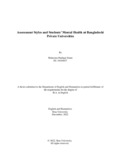| dc.description.abstract | The onset of COVID-19 has brought about drastic changes in everyone’s lives, especially of the
student body. Although students are seen to perform well academically during the lockdown, the
social media is strewn with cries of deteriorating mental health due to the sudden shift of some
private universities from offline to online medium. The purpose of this study is to officially
recognize those cries to depict the relationship between online assessment and mental health so
that they can work together in harmony instead of one sabotaging the other. Four private
universities have participated in this study. The participant selection is done through purposive
sampling so that they fit the purposes of the study. The data collection procedure involved taking
screenshots of mental health issues in relation to online assessment of undergraduate students’
Facebook posts of the respective university groups and conducting semi-structured interviews of
undergraduate students. In total, 27 screenshots were taken and 16 interviews, conducted.
Pseudonyms are used to refer to the participants. The researcher has used a conceptual
framework by combining some established theoretical knowledge on depression, anxiety and
burnout, drawn from official medical websites. Analysis of the data involved relating the
elements to the students by transcribing the interviews including the hesitations, generating
distinct codes upon reading the transcript, generating themes and subsequent themes from the
codes derived. The data was then thematically analysed to relate the elements – depression,
anxiety and burnout to the students based on the findings. The findings revealed that although
there are few advantages such as availability of recorded lectures, majority of the participants
faced great difficulties with the onset of the online semester and its coursework – the
disadvantages such as isolation, alienation and rise of mental and physical health issues, such as
depression and finger joint aches, outweigh the little advantage they enjoyed; and there are some participants for whom the change made no difference, suggesting that the online assessment style
have worsened students’ mental health. Analyzing the data showed that particular modes of
assessment made the students experience the symptoms outlined for depression, anxiety and
burnout in the literature review of this study to a great extent because those assessment styles
broke the principles of assessment - validity, reliability, practicality and authenticity, resulting in
a negative washback. The researcher concluded that, indeed the online assessment style
worsened the students’ mental health – they have depression – particularly, functional
depression, burnout, generalized anxiety disorder and panic disorder, given that it was absent
during their pre-pandemic times. | en_US |

